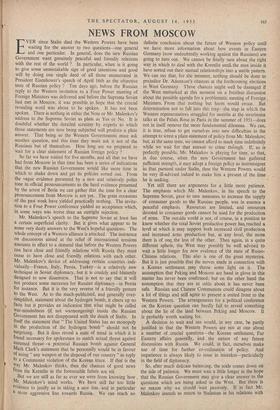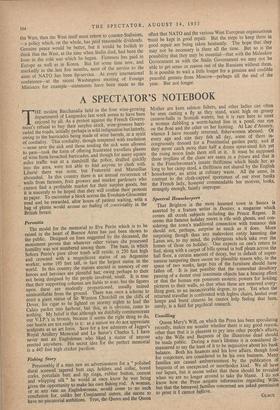NEWS FROM MOSCOW
EVER since Stalin died the Western Powers have been waiting for the answer to two questions—one general and one particular. In general, does the new Russian Government want genuinely peaceful and friendly relations with the rest of the world ? In particular, when is it going to give some unmistakable sign of good intentions and good will by doing one single deed of all those enumerated in President Eisenhower's speech of April 16th as the objective tests of Russian policy ? Ten days ago, before the Russian reply to the Western invitation to a Four Power meeting of Foreign Ministers was delivered and before the Supreme Soviet had met in Moscow, it was possible to hope that the crucial revealing word was about to be spoken. It has not been spoken. There is nothing in either the Note or Mr. Malenkov's address to the Supreme Soviet as plain as Yes or No. It is doubtful whether the detailed scrutiny by experts to which those statements are now being subjected will produce a plain answer. That being so the Western Governments must ask another question, and this time they mutt ask it not of the Russians but of themselves. How long are we prepared to wait for a clear statement of Russian foreign policy ?
So far we have waited for five months, and all that we have had from Moscow in that time has been a series of indications that the new Russian Government would like more time in which to shake down and get its policies sorted out. From the vague evidence presented by a new and relatively polite tone in official pronouncements to the hard evidence presented by the arrest of Berta we can gather that the time for a clear pronouncement from Moscow is not yet. The great occasions of the past week have yielded practically nothing. The invita- tion to a Four Power conference yielded an acceptance which, in some ways was worse than an outright rejection.
Mr. Malenkov's speech to the Supreme Soviet at least has a certain superficial clarity. But it gives what appear to be some very dusty answers to the West's hopeful questions. The whole concept of a Western alliance is attacked. The insistence on discussions aimed at the relief of international tensions amounts in effect to a demand that before the Western Powers can have close and friendly relations with Russia they must cease to have close and friendly relations with each other. Mr. Malenkov's device of addressing certain countries indi- vidually—France, Italy, Persia, Turkey—is a relatively new technique in Soviet diplomacy, but it is crudely and blatantly designed to sow dissension. That is not to say that it will not produce some successes for Russian diplomacy—in Persia for instance. But it is the very reverse of a friendly gesture to the West. As to the much-publicised, and generally over- simplified, statement about the hydrogen bomb, it clears up no ; , facts but it provides an indication that what might be called war-mindedness (it not warmongering) inside the Russian Government has not disappeared with the death of Stalin. In itself the statement that " The United States has no monopoly in the production of the hydrogen bomb " should not be surprising. But it does reveal a state of mind in which it is found necessary for spokesmen to match actual threat against assumed threat—a potential Russian bomb against General Mark Clark's statement that he personally would be in favour of using " any weapon at the disposal of our country "4n reply to a Communist violation of the Korean truce. If that is the from Mr. Malenkov thinks, then the chances of good news from the Kremlin in the foreseeable future are nil.
But we are still as far as ever we were from knowing how , Mr. Malenkov's mind works. We have still far too little evidence to justify us in taking a new line, and in particular a more aggressive line towards Russia. We can reach no definite conclusion about the future of Western policy until we have more information about how events in Eastern Germany (now undoubtedly working against the Russians) are going to turn out. We cannot be finally sure about the right way in which to deal with the Kremlin until. the men inside it have sorted out their mutual relationships into a stable pattern. We can say that, for the moment, nothing should be done to prejudice Dr. Adenauer's chances at the forthcoming elections in West Germany. Those chances might well be damaged if the West embarked at this moment on a fruitless\ discussion about the possible agenda for a problematic meeting of Foreign Ministers. From that nothing but harm would ensue. But determination not to fall into this trap—the trap in which the Western representatives struggled for months at the wearisome talks at the Palais Rose in Paris in the summer of 1951—does not in itself remove the more fundamental dilemma. We can, it is true, refuse to get ourselves into new difficulties in the attempt to wrest a plain statement of policy from Mr. Malenkov; but, at the same time, we cannot, afford to mark time indefinitely while we wait for that answer to come thibugh. If, as is perfectly possible, Mr. Malenkov is playing for time, so that. in due course, when the new Government has gathered sufficient strength, it may adopt a foreign policy as instransigent as that pursued under Stalin, then the Western Powers would be very ill-advised indeed to make him a present of the time he is seeking.
Yet still there are arguments for a little more patience. The emphasis which Mr. Malenkov, in his speech to the Supreme Soviet, gave to new measures to increase the supply of consumer goods to the Russian people, was in essence a peaceful emphasis. Resources are limited, and resources devoted to consumer goods cannot be used for the production of arms. The outside world is not, of course, in a position to know whether the total Soviet productive power has reached a level at which it may support both increased civil production and increased arms production but, at any level, the more there is of one, the less of the other. Then again, in a quite different sphere, the West may possibly be well advised to wait a little longer for new evidence of the state of Russo- Chinese relations. This also is one of the great mysteries. But it is just possible that the moves made in connection with a Korean settlement may throw Some light on it. The assumption that Peking and Moscow are hand in glove in this matter has never been confirmed; but on the other hand the assumption that they are at odds abort it has never been safe. Russian and Chinese Communists could disagree about a lot of things and still agree to present a united front to the Western Powers. The arrangements for a political conference on the Korean question can hardly fail to reveal something about the lie of the land between Peking and Moscow. It is probably worth. waiting for.
A decision to wait and see would, in any case, be partly justified in that the Western Powers are not at one about a number of crucial questions—the Korean settlement, Far Eastern affairs generally, and the nature of any future discussions with Russia. We could, in fact, ourselves make use of time for further co-ordination of policy. And impatience is always likely to issue in Mistakes—particularly in the field of diplomacy.
' So, after much delicate balancing, the scale comes down on the side of patience. We must wait a little longer in the hopo that the Russian Government may give a clear answer to the questions which are being asked in the West. But there is no reason why we should- wait passively. If in fact Mr. Malenkov intends to return to Stalinism in his relations with the West, then the West itself must return to counter-Stalinism, —a policy which, on the whole, has paid reasonable dividends. Genuine peace would be better, but it would be foolish to think that the West, at the time when Stalin died, had been the loser in the cold war which he began. Firmness has paid in Europe as well as in Korea. But for some time now, and markedly in the.last five months, most of the service to the aims of NATO has been lip-service. At every international conference—at the recent Washington meeting of Foreign Ministers for example—statements have been made to the effect that NATO and the various West European organisations Itnust be kept in good repair. But the steps to keep them in good repair are being taken hesitantly. The hope that they may not be necessary is there all the time. But so is the possibility that they may be essential—that with the Malenkov Government as with the Stalin Government we may not be able to get sense or reason out of the Russians without them. It is possible to wait a little longer for a genuine and credible peaceful gesture from Moscow—perhaps till the end of the year. But not longer.



































 Previous page
Previous page